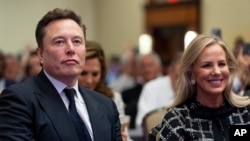U.S. President-elect Donald Trump returned triumphantly to Washington on Wednesday and walked into the White House for the first time in four years to meet with outgoing President Joe Biden.
Biden invited Trump for the traditional visit — a show of the coming Jan. 20 peaceful transfer of power in the American democracy between the current U.S. leader and the incoming chief executive.
But the Biden-Trump get-together is rife with political tension.
Biden, a Democrat running for reelection, had sought to defeat Trump, the Republican, for a second time before ending his campaign in July after he faltered badly in a debate against him. Biden quickly endorsed his vice president, Kamala Harris, to succeed him, but Trump swept through seven political battleground states in the election and easily defeated her.
When Biden defeated Trump in 2020, Trump offered no White House invitation to meet him ahead of the inauguration and then left Washington two hours before Biden’s swearing-in on the steps of the U.S. Capitol.
Trump, who to this day claims falsely that he was cheated out of winning the 2020 election by vote fraud, was the first president to not witness his successor’s inauguration since Andrew Johnson skipped the swearing-in of Ulysses S. Grant in 1869.
Trump also met with Republican lawmakers in the House of Representatives. Republicans hold a narrow majority in the chamber in the current Congress and are nearing a slight majority control in the Congress set to be sworn in Jan. 3, but the outcome of more than a dozen seats remains uncertain.
Trump has moved quickly to fill his nascent administration with Republican officials who have been the most politically loyal to him in the four years he was out of office. He has sought to fill several key defense and national security positions, including Pete Hegseth, a Fox News host and veteran of the wars in Iraq and Afghanistan, to be his next defense secretary.
The choice of Hegseth was outside the norm of those usually named as the Pentagon leader. But he was a vocal supporter of Trump during his first term, embracing his “America First” agenda of trying to withdraw U.S. troops from abroad and often taking up the cause of combat veterans accused of war crimes.
Trump has also announced South Dakota Governor Kristi Noem as his choice for Homeland Security chief, picked John Ratcliffe as the director of the CIA and, according to news accounts, settled on Florida Senator Marco Rubio as secretary of state, the country’s top diplomat.
Both Rubio and Noem were on Trump’s short list of possible vice-presidential running mates several months ago. While Trump later picked first-term Ohio Senator JD Vance, now the vice president-elect, to join him on the Republican national ticket, both Rubio and Noem remained Trump stalwarts as he won the election.
Ratcliffe was the nation’s sixth director of national intelligence, serving for the last eight months of the Trump administration after a rocky confirmation process.
Trump also announced that billionaire businessman Elon Musk and entrepreneur and former Republican presidential candidate Vivek Ramaswamy will lead what he called the Department of Government Efficiency. The announcement said they would provide advice and guidance to “drive large-scale structural reform” of the federal government.
The acronym for the new agency, DOGE, is a nod to Musk’s favorite cryptocurrency, dogecoin.
Other notable picks by Trump include William McGinley as White House Counsel, Florida Congressman Michael Walz as national security adviser and Thomas Homan, former acting immigration chief, to be “border czar” to head efforts to deport undocumented migrants living in the United States.
Just ahead of the election, Trump, who only rarely publicly admits making any mistakes, told podcaster Joe Rogan that his biggest error during his term from 2017 to 2021 was hiring “bad people or disloyal people.”
“I picked some people that I shouldn’t have picked,” he said.
Some of the top officials Trump chose then, including former chief of staff John Kelly and national security adviser John Bolton, became sharp public Trump critics after he ousted them. Kelly said during this year’s campaign that Trump met the definition of a fascist ruler. Trump attacked both former officials, calling Kelly “a bully but a weak person” and disparaging Bolton as “an idiot.”
Rubio sparred sharply with Trump during their 2016 run for the Republican presidential nomination, which Trump captured enroute to his first term as president. Rubio mocked Trump as having small hands and sporting an orange spray tan, while Trump derided Rubio as “little Marco.”
But Rubio, like numerous other one-time Trump critics, was a staunch Trump supporter in this year’s campaign. In recent years, Rubio has proved to be an outspoken foreign policy hawk, taking hard lines on U.S. relations with China, Iran, Venezuela and Cuba.



